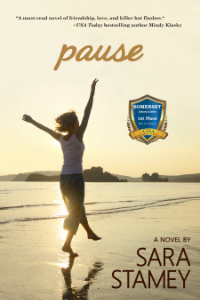
A closer look at Sara Stamey’s novel Pause from fellow Book View Cafe author Katharine Eliska Kimbriel
I loved Pause. It’s a swift, absorbing read for the right audience. It’s not a classic romance, but matters of the heart are weighed. TW for emotionally abusive ex-husband & father in past of the timeline–yes, the past set Lindsey up for the wrong marriage, but we see her breaking free of those patterns. Also TW because a malpractice case is woven into the plot.
Lindsey may be 52, but she hasn’t lost her desire for a good life–vitality could be her middle name. I finished this book feeling like she’d made huge strides–in relationships, work, and with her complicated family. It was, to use that good old word, inspiring in a way. I hope it will be for you.
In fact, I liked it so much I offered the author a blurb.
“Meet Lindsey Friedland, trapped in a liminal space between a failed marriage and a dead-end job she’s good at–until a swirl of friendship, fears, and love in all forms sweeps her back into the Now of possibility. Join her as Lindsey discovers that if you can only center your life in the Now, even for brief moments, Happily Ever After might just take care of itself.”
And, since I still had a few questions for Sara, here’s a mini-interview:
Kathi:
Did you layer your creation of Lindsay as you started writing this book? Or was she born organically, a woman of her time with the experiences of yourself, your friends, and others you had observed?
Sara:
Hi, Kathi! Good questions. This novel is very different from my previous ones, which are more action-centered and draw on research and my experiences traveling and living in different countries. (Or, in the case of my science fiction novels, different worlds of my imagination.)
Pause grew organically from a journal I was keeping during a difficult transition midlife – cancer and divorce from an abuser, all whipped to a blaze by extreme hot flashes! Like my character Lindsey, I tried humor to ease the rough patches, and managed to make myself laugh. Some of Lindsey’s absurd attempts at midlife dating were closer to my own than I’d like to remember!
When life began to settle and I was teaching creative writing at Western Washington University, I thought, “If I’m expecting my students to write stories, I better get going again myself.” So the novel began, and right from the start Lindsey had a distinctive voice and attitude. She is more outspoken than I am, but we share our love of the Pacific Northwest environment and outdoors activities.
Kathi:
The PNW is actually a character in its own right in Pause. How did you decide how to portray what sports and outdoor hobbies Lindsay pursues?
Sara:
Place is always important in my novels, as I’m very immersive in my writing approach. I need to see, feel, hear, smell, and maybe even taste places. (And I love it when other writers let me travel to new places that way.) What’s different for me with Pause is that it’s my native stomping grounds, as I’m fourth-generation here in our “far corner” of the States. Before, I’ve described settings from an outsider’s perspective, when all the senses are on high alert and new impressions are vivid. With my very familiar settings, such as the Goat Mountain hike and the Fern Lake hike from Pause, I just had to crank up my many sensory memories (or take a great excuse to hike them again), close my eyes, and “be, here, now,” Lindsey’s new mantra.
The final scene at the Olympic Peninsula ocean beach is pretty much my own “liberation hike” when I claimed my independence, danced along the wave line, and enjoyed a visit from a mother river otter and her young one.
Kathi:
What was the most difficult part of Pause for you to write?
Sara:
There’s no concealing that this novel draws elements from my own life and some difficult family issues, though fictionalized. After revising an early draft with my wonderful writer’s group here in town, I set it aside for years because I felt it would be upsetting to my elderly mother. Once Mom was gone, I revisited the story and revised again with the help of our terrific Book View Café author-members. I was also concerned that writing about Lindsey’s abusive father Arlen, very much like my own father (now also deceased), might be uncomfortable for my sisters, but they have been supportive. And given the momentum of the #MeToo movement, I felt it was time to break my family training “not to talk about it.”
Beyond those considerations, yes, it was difficult to immerse myself in Lindsey’s emotional traumas, but also liberating to dance with her past them.
Thanks, Kathi, and all of my fellow Book View Café members of our coop publishing group!

